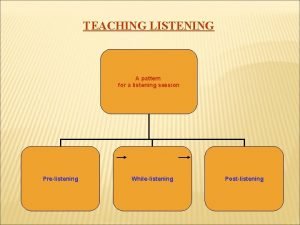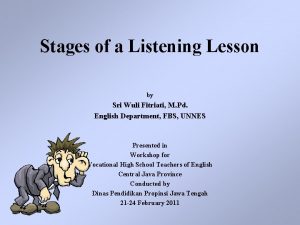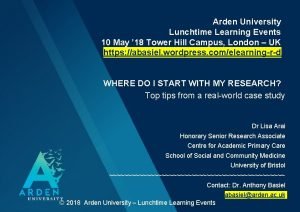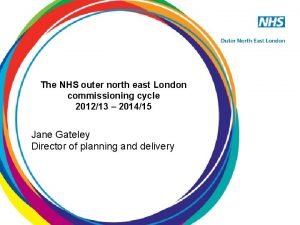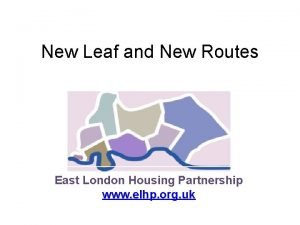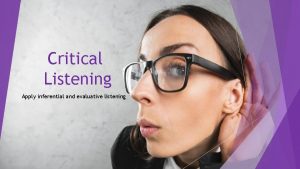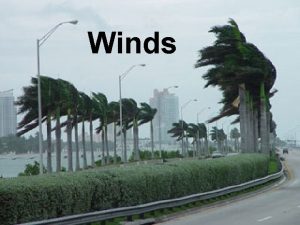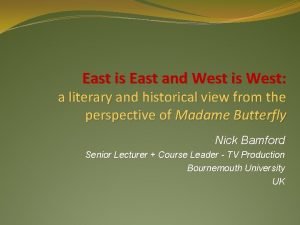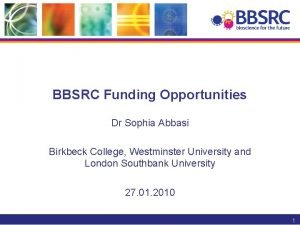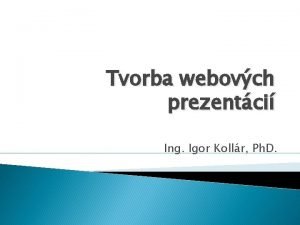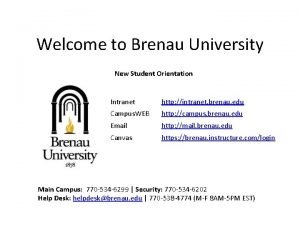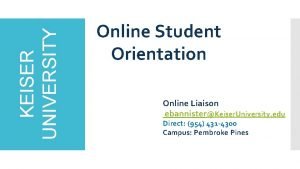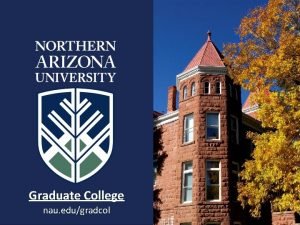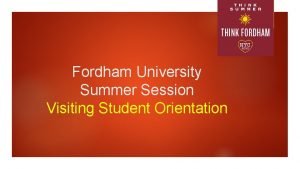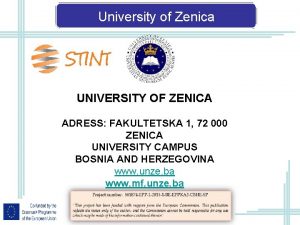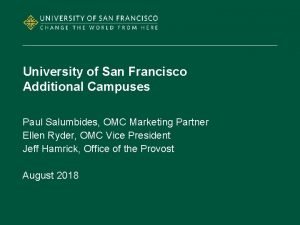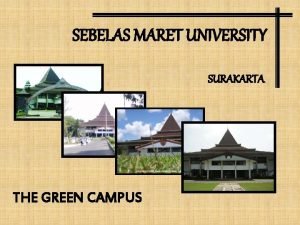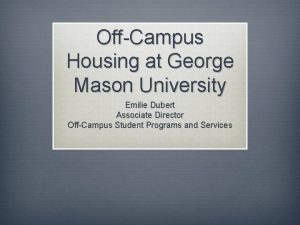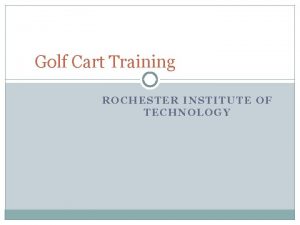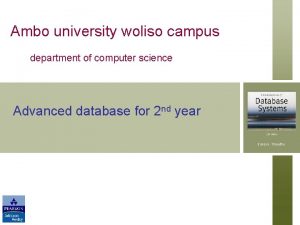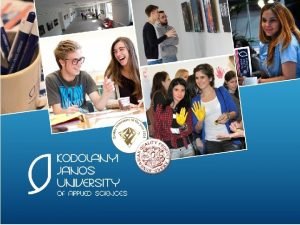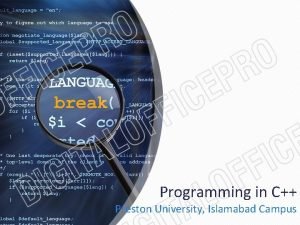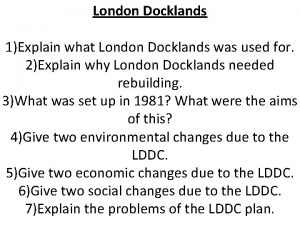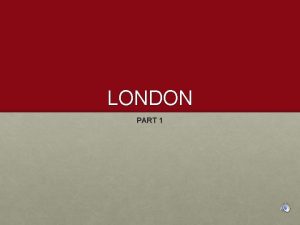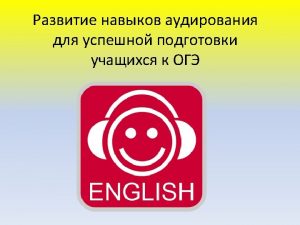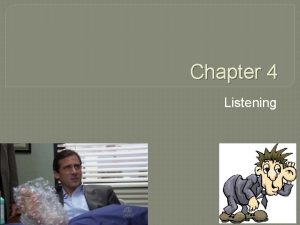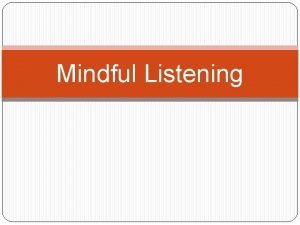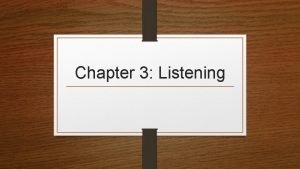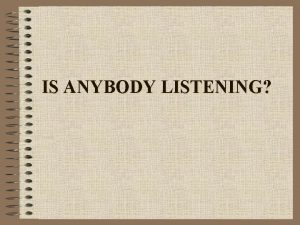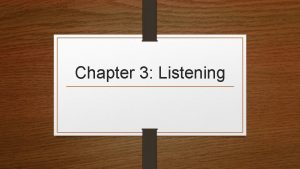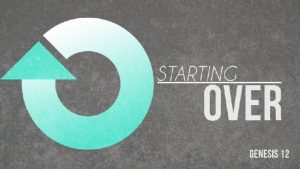University of East London Docklands Campus Listening to
































- Slides: 32

University of East London (Docklands Campus) Listening to Learners: Partnerships in Action Wednesday 22 April, 2009 Student voice, democracy and the necessity of radical education Michael Fielding Institute of Education, University of London m. fielding@ioe. ac. uk

Recent Contexts Changing view of childhood UN Convention on Rights of the Child 1989 School improvement Of. STED Inspection framework Citizenship + Healthy Schools Consumerism Public service ‘reform’ Children’s Commissioner Work of Professor Jean Rudduck

Youth: tracing conceptual renewal Industrial (modernity 1945 -1975) Post-industrial (late modernity 1976 - ) Youth as transitional period to adulthood Blurring lines between youth and adult Adulthood – a point of arrival Adulthood – a state of reinvention & improvement Youth as future of society: both hope & threat Youth as decision-makers + entrepreneurs in the present Youth as deficit (pupils, patients) Youth as partners (colearners, self-managing) Youth as responsibility of the Youth as consumer (client, state (student) choice-maker) Mainstream and at-risk Diversity Source: Wyn, 2009.

Immediate Contexts Government Legalisation / Initiatives / Research Every Child Matters Personalised Learning Specialist Schools & Academies Trust NCSL ‘Real Decision Making? School Councils in Action’ ‘Working Together: Giving children and young people a say’ NGOs / Foundations Esmée Fairbairn / Carnegie YPI Futurelab Academic Research + Publications ESRC TLRP ‘Consulting Pupils about T&L’

New pressures … Our structured programme provides your baby with a complete developmental workout. It helps to build the strong neural pathways that are vital for early brain development and all subsequent learning. . . www. babycollege. co. uk

Yes. . . You Can Have A Smarter Baby! Don't Miss This. . . You Can't Ever Get This Time Back! www. prenatalmusic 4 life. com The Secret of Prenatal Learning Love. . . Nurture. . . Communicate. . . and Teach Your Baby Before Birth

New pressures … Birth to three matters Maps ‘Skill & competence’ of babies and toddlers aged 0 -3 4 themes, 16 dimensions, 64 components with detailed guidance on • Observing & recording • Planning • Responding to diversity • Challenges

Range of Student Voice Activities (1) Peer support Buddying systems Peer tutoring / listening Peer teaching Peer mediator Circle time (same year / mixed age)

Range of Student Voice Activities (2) Organisational reflection + renewal ‘School’ / student councils Student teams e. g. Mulberry School for Girls, Tower Hamlets / Blue School, Wells / Ringwood School, Hampshire Working party reps Student governors Student ambassadors Tour guides Appointment panels Junior Leadership Team e. g. Greenford High School, Ealing School Improvement Plans / policy writing Mixed-age Circle Time e. g. Wroxham School, Potters Bar Healthy Schools Of. STED ECM

Range of Student Voice Activities (3) Teaching & Learning Af. L Lead-learners Students as Learning Partners Students-as-co-researchers Students-as-researchers Student-led learning walks Evaluating work units Dept / Unit development plans

Range of Student Voice Activities (4) Classroom consultation (with your own class) Classroom observation (including Sa. LPs) Video recording Questionnaires ‘Transforming learning’ Focus groups Interviews Suggestion boxes Diaries Photos Collage Learning Review Meetings

From audience to author, from data to dialogue (1) how adults listen to and learn with students in schools Classroom Students as Individual Data Source performance data Students as Active Respondents Students as Af. L lead learners Developing Coindependent Researchers learning Dept / Team Samples of student work School Student attitude surveys Team agenda Students on + student staff perceptions appointment panels ‘History Joint review of Dudettes’ rewards (History Dept system review team)

From audience to author, from data to dialogue (2) how adults listen to and learn with students in schools Classroom Students as Knowledge Creators YP + Adult Co-authors Joint Enquiry YP + Adults in search of the Common Good Dept / Team What Makes a Evaluate Good Lesson? playground buddying system Stantonbury Develop unit Day 10 on e. g. /department research poetry writing lesson Y 6 + museum Participatory staff + teacher Democracy co-plan visit for Y 3 Classes as critical friends in thematic exploration School Low level bullying Staff + student Learning Walks Whole school forum e. g. Alex Bloom, St George-in-the. East, Stepney

Ongoing practical challenges (1) Inclusion Which students? Whose voices? race gender social class ability labelling An unusual, elite activity? or an inclusive commitment that involves all students in all aspects of their lives at school?

30% decline in sense of being "listened to" around teaching + learning between Y 3 + Y 11 Despite 2004 Children Act and Of. STED's 2005 framework, Antidote’s recent School Emotional Environment for Learning Survey (SEELS) survey of 23, 000 students shows that, between Y 3 and Y 11, they experience a 30% decline in their sense of being "listened to" around teaching and learning. ‘Students say the structures + systems set up to collect their views involve too few people + have little chance of making meaningful changes to school life. The students taking part are often the most articulate, intelligent + well-behaved. The rest then feel there is little point in even being interested. ’ Source Antidote e-News, November 2008

Ongoing practical challenges (2) Teacher tensions Pressures of time + curriculum coverage Lack of institutional support Beyond pockets of isolated practice (role of LA + national + international networks) Consumerism or democratic agency? e. g. “You’re no good, no bullet points, too much thinking, not thick enough files” Using students? Refusing the role of ‘quality assurance donkeys’ ‘Beating up’ teachers? e. g excesses of covert observation

Ongoing intellectual challenges (1) 1 Becoming a person no real account of how we become persons 2 Exploitation or fulfilment? no way of distinguishing between new forms of exploitation / intensification + approaches that are genuinely concerned for the whole person 3 Democracy little sustained or confident reference to democracy as a way of living and learning

Ongoing intellectual challenges (2) 4 History no sense of historical location + the glib dismissal of anything prior to 1988 Countering ‘the enormous condescension of posterity’ E. P. Thompson

Thinking back and thinking at all Society remembers less and less faster and faster. The sign of the times is thought that has succumbed to fashion; it scorns the past as antiquated while touting the present as the best. Society has lost its memory, and with it, its mind. The inability or refusal to think back takes its toll in the inability to think. Source Social Amnesia: a critique of conformist psychology Russell Jacoby 1996

Ongoing intellectual challenges (3) 5 Educational Values presumption of sameness, domestication of ‘moral purpose’, + denial of radical traditions 6 Political Fundamentals no attempt to distinguish between the demands of global capitalism and the possibility of a different kind of society

New developments in student voice: shaping schools for the future part funded by Esmee Fairbairn Foundation 1 Radical inclusion involving those whose voices are seldom heard 2 Reversing roles students as agents of adult professional learning 3 Co-constructing the common good remaking public spaces in schools where adults + young people can have an open dialogue

Personalized learning Person centred education Student consultation Participatory democracy Instrumental Communal (solitary) (individual) (plural) (mutual) Voice Individual voice Relational conversation Representative voice Restless dialogue Main concern Instrumental outcomes Lead a good life Utilise all perspectives to improve results Co-create a good society / better world Energiser Individual ambition Personal development Full informed accountability Shared responsibility for a better future Dominant model Consumer choice Family / friendship Learning organisation Learning community Key question What job do I wish to do / course do I wish to take? What kind of person do I wish to become? How can we learn How do we develop from everyone to an inclusive, achieve better creative society outcomes? together?

What it means to live a good and meaningful life ‘In our short-term and disposable society there need to be spaces where young people can discuss what it means to live a good and meaningful life and the kinds of people they wish to become’ ‘Living in “X Factor” Britain: Neo-liberalism and “Educated” Publics’ Nick Stevenson Soundings ‘Class and Culture debate’ (2008) http: //www. lwbooks. co. uk/journals/soundings/class_and_culture/stevenson. html

Spaces for dialogue and discussion Within the school Where are the spaces, both formal and informal for dialogue and discussion for students? for staff? for students and staff? Where are the spaces for the exploration and articulation of a life narrative? Where are the spaces for restless encounter where we come to re-see each other and open up a new possibilities ?

Spaces for restless encounter (1) Affirm engage Re-see (Restless encounter) Renew Celebration Challenge replace Pedagogy Approach communal events in ways which enable a range of people to contribute Self-managed learning groups Pair / group /project work + communal presentations Critical pedagogy Teacher as co-learner (Michael Armstrong) Department / integrated teams Department A Level residentials Field trips Dept / course review (students) Apply insights to develop earlier / new practices CPD Students as Learning Partners MSO (Mutual Support + Observation)

Spaces for restless encounter (2) Affirm engage Re-see (Restless encounter) Celebration Challenge Renew replace Curriculum structures Approach communal events in ways which enable a range of people to contribute Day / Week 10 (Stantonbury) Mixed age, thematic conferences (St George’s) Tartan curriculum (Bishops Park College) apply insights to develop earlier / new practices School USSR (Sbor) Countesthorpe (Moot) Stantonbury (Hall Meeting) St George's (School Meeting) System Prefigurative practice Progressive networks / alliances Radical traditions apply insights to develop earlier / new practices Draw strength from depth of thinking and counter examples

DEMOCRATIC STRUCTURES St George-in-the-East Secondary School, Stepney, London (1953) Staff Panel All staff (about 10) Students School Pupil Panel Head Boy / Girl Deputy HB/G Form Reps Secretary Headteacher Joint Panel Staff Panel Member Head Boy / Girl Chairs of Pupil Committees Headteacher Weekly Meeting Schedule Form Meeting Pupil Committees Monday Morning Staff Panel Monday lunchtime Ongoing dance meals sport tidy social Pupil Panel Friday Morning Monthly Meeting Schedule Pupil Panel Staff Panel ▼ ▼ Joint Panel Last Friday of the month ▼ School Council [whole school: students + staff] Monday following Joint Panel Meeting


DEMOCRATIC RELATIONSHIPS St George-in-the-East Secondary School, London (1953) Individual significance + communal contribution ‘the child must feel that … he does count, that he is wanted, that he has a contribution to make to the common good’ The community’s capacity to inspire commitment ‘the child must feel the school community is worthwhile’ From fear ‘Fear of authority, fear of failure, fear of punishment’ From exclusion No competition No marks / prizes No streaming / setting No punishment To friendship ‘Friendship, security and the recognition of each child’s worth’ To inclusion emulation / ipsative striving intrinsic motivation + communal recognition all ability, sometimes mixed-age grouping restorative, communal response

DEMOCRATIC LEARNING St George-in-the-East Secondary School, London (1953) Communal frameworks for individual + group learning School study (agreed theme) e. g Man’s Dependence on Man Thematic day conference where work is shared Residential camps Learning in the community Negotiate what you learn Mixed age Electives (choose what to study after taster session) Art Book-binding Creative writing Debates Drama Dramatic reading Fabric printing French Housecraft Italic writing Literature Music Mythology Needlecraft Poetry Puppetry Recorder playing Weaving What’s on? Woodwork Student initiated Extra Maths Extra English Non-groups group absorb into existing group include in new activity Each class approaches School Study differently – internal negotiation Learn with + from each other (students + staff) Relationships with class teacher Individual Weekly reviews Form meetings (Whole) School Council / School Meeting

A vision of what the new form of Secondary School can be ‘The pioneering and missionary work which has been carried out over the past two and a half years, always in a spirit of confident adventure, has attained not only the goal which the school set itself from the beginning, but also something much more – it has given a vision of what the new form of Secondary School can be. ’ Report by H. M. Inspectors St, George-in-the East County Secondary School, Stepney, London Inspected 25 th-27 th February, 1948

Why Alex Bloom is important Caring relationships Freedom in the context of community Significance and identity - contribute to common good Worthwhile, inclusive community Live the future now (radical tradition) Democracy as a way of living + learning insistent affirmation of possibility
 London docklands regeneration
London docklands regeneration Pre while post listening
Pre while post listening While listening stage
While listening stage Arden university tower hill campus
Arden university tower hill campus Outer north east london
Outer north east london Orthopaedic surgery south east london
Orthopaedic surgery south east london East london port
East london port East london housing partnership
East london housing partnership South east london stp
South east london stp Active vs passive listening
Active vs passive listening Evaluative listening examples
Evaluative listening examples Horizontal movement of air
Horizontal movement of air Laissez faire theory
Laissez faire theory East is east and west is west
East is east and west is west Birkbeck university of london
Birkbeck university of london University college london
University college london Brenau canvas student login
Brenau canvas student login Keiser student login
Keiser student login Nau grad college
Nau grad college Fordham university rose hill campus map
Fordham university rose hill campus map Ambo university woliso campus
Ambo university woliso campus Campus of university of zenica
Campus of university of zenica Msei usfca
Msei usfca Transilvania university romania
Transilvania university romania Sebelas maret university campus
Sebelas maret university campus Mason off campus housing
Mason off campus housing Rit campus map
Rit campus map Ambo university woliso campus
Ambo university woliso campus Kodolan
Kodolan Preston university islamabad campus
Preston university islamabad campus Meiji university ikuta campus
Meiji university ikuta campus Catholic university of korea songsin campus
Catholic university of korea songsin campus Slu hrc
Slu hrc

